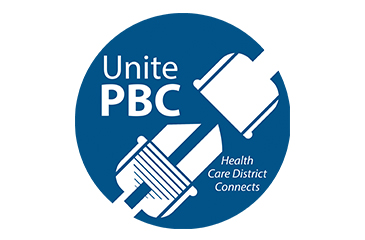HFYH: Unite PBC: Connecting to Social Services May be the Best Medicine

Search the internet for the leading causes of death in the United States and you’ll find a variety of responses that might resemble the following list [1]:
- Heart disease: 647,457 deaths annually
- Cancer: 599,108 deaths annually
- Accidents (unintentional injuries): 169,936 deaths annually
- Chronic lower respiratory diseases: 160,201 deaths annually
- Stroke (cerebrovascular diseases): 146,383 deaths annually
There is another list though, of equal, and perhaps greater importance in the battle against the diseases and conditions that claim American lives. The other list is equally as impactful and one that can potentially be addressed with interventions that do not require the latest advances in medicine and science. The list [2] of causes of death below can be addressed by everyone, collectively working together to help our neighbors and those who face difficult challenges in their daily lives:
- Low education: 245,000 deaths annually
- Racial segregation: 176,000 deaths annually
- Low social support: 162,000 deaths annually
- Individual-level poverty: 133,000 deaths annually
- Income inequality: 119,000 deaths annually
- Area-level poverty: 39,000 deaths annually
The mortality estimates from social issues like low education, poverty, and income are comparable to deaths caused by the leading pathophysiological causes. The number of deaths attributable to low education is comparable to the number caused by acute myocardial infarction. The number of deaths attributable to racial segregation is comparable to the number from cerebrovascular disease. And the number attributable to low social support is comparable to deaths from lung cancer.
The leading causes of death presented above are part of a group of variables known as Social Determinants of Health (SDoH). SDoH are conditions in the places where people live, learn, work, and play that affect a wide range of health and quality-of life-risks and outcomes.[3] SDoH are not easy to address and often require great investment (i.e. poverty), but it is imperative that as a community a concerted, technologically-advanced focus be placed on addressing these conditions so everyone has a chance to achieve their fullest potential in leading healthy and productive lives.
How can we address Social Determinants of Health?
Organizations in every community are trying to address SDoH every day. They range from small non-profit organizations to municipal, county, and state governments. Programs are available to address hunger through food pantries and similar resources. Agencies address homelessness and housing assistance through homeless shelters, rental assistance and temporary housing. Other programs help with utility payments, transportation, education, job training and critical mental health support.
 In many communities a variety of these services and programs are available. However, building awareness of the programs, connecting those in need and then tracking and measuring outcomes present an ongoing challenge. To address this challenge, Palm Beach County has introduced Unite PBC!
In many communities a variety of these services and programs are available. However, building awareness of the programs, connecting those in need and then tracking and measuring outcomes present an ongoing challenge. To address this challenge, Palm Beach County has introduced Unite PBC!
Unite PBC is a community-wide coordinated network of service providers who are connecting clients to their social service, medical, and behavioral health needs. Unite PBC is a new initiative of the Health Care District of Palm Beach County. While still in the early stages, the network of providers is growing, referrals for critically-needed services are being sent, and the expectations are high!
Darcy J. Davis, CEO of the Health Care District of Palm Beach County, explains that “Through Unite PBC, the Health Care District seamlessly connects residents in need of vital social services to the county’s many outstanding community organizations that deliver health and human services, like food pantries, housing assistance and transportation. This model of care supports our mission to fill the gaps in our county’s healthcare delivery system.”
Unite PBC utilizes the social services referral platform, Unite Us, to allow for the efficient referral of patients or clients to the services they need. The referral platform transforms the outdated process of using written lists of social service organizations and places them into a real-time, electronic system. The Unite PBC platform allows the social service organizations to case manage clients’ needs to ensure that they are quickly connected to one or more organizations. The new Unite PBC referral network does away with clients simply receiving contact information for a service organization with little or no follow-up, and instead provides the referring organization with confirmation that the services were provided. By tracking and measuring outcomes, Unite PBC will provide metrics to help identify opportunities for improvement.
Together, through Unite PBC, we can all address Social Determinants of Health to help reduce the leading causes of death attributable to social factors. Homeless patients can be connected to a food pantry where they receive nutritious food to help them better control their diabetes. The pregnant mom who lacks transportation can be linked to a local agency so she can travel to all of her prenatal visits. The family that is struggling to choose between paying their rent and electricity bill or their lifesaving prescriptions can be connected to an organization that provides rent or utility assistance, enabling them to continue taking their medications.
Social factors are intertwined with good health. Addressing these gaps is as important as addressing an individual’s medical conditions. The two-pronged approach will lead to better health, greater efficiencies and improved outcomes for everyone.
About the Health Care District
The Health Care District of Palm Beach County provides primary medical care, dental services and COVID-19 testing for adults and children at the C. L. Brumback Primary Care Clinics, health coverage programs for eligible uninsured residents, a pharmacy operation, a nationally-recognized Trauma System, registered nurses in nearly 170 public schools, short and long-term skilled nursing at the 5-star rated Edward J. Healey Rehabilitation and Nursing Center in Riviera Beach, and acute care at its teaching hospital, Lakeside Medical Center, which is accredited by The Joint Commission and serves the rural Glades’ communities.
About the C. L. Brumback Primary Care Clinics
This project is supported by the Health Resources and Services Administration (HRSA) of the U.S. Department of Health and Human Services (HHS) under grant number H80CS25684 for Health Center Cluster in the award amount of $7,019,063. Of the total project, 78.6% is financed with nongovernmental sources. This information or content and conclusions are those of the author and should not be construed as the official position or policy of, nor should any endorsements be inferred by HRSA, HHS or the U.S. Government. The C. L. Brumback Primary Care Clinics were granted Federal Tort Claims Act (FTCA) deeming status effective January 1, 2020.
[1] https://www.cdc.gov/nchs/fastats/leading-causes-of-death.htm
[2] Estimated Deaths Attributable to Social Factors in the United States
Sandro Galea, Melissa Tracy, Katherine J. Hoggatt, Charles DiMaggio, Adam Karpati
Am J Public Health. 2011 Aug; 101(8): 1456–1465.
[3] https://www.cdc.gov/socialdeterminants/index.htm